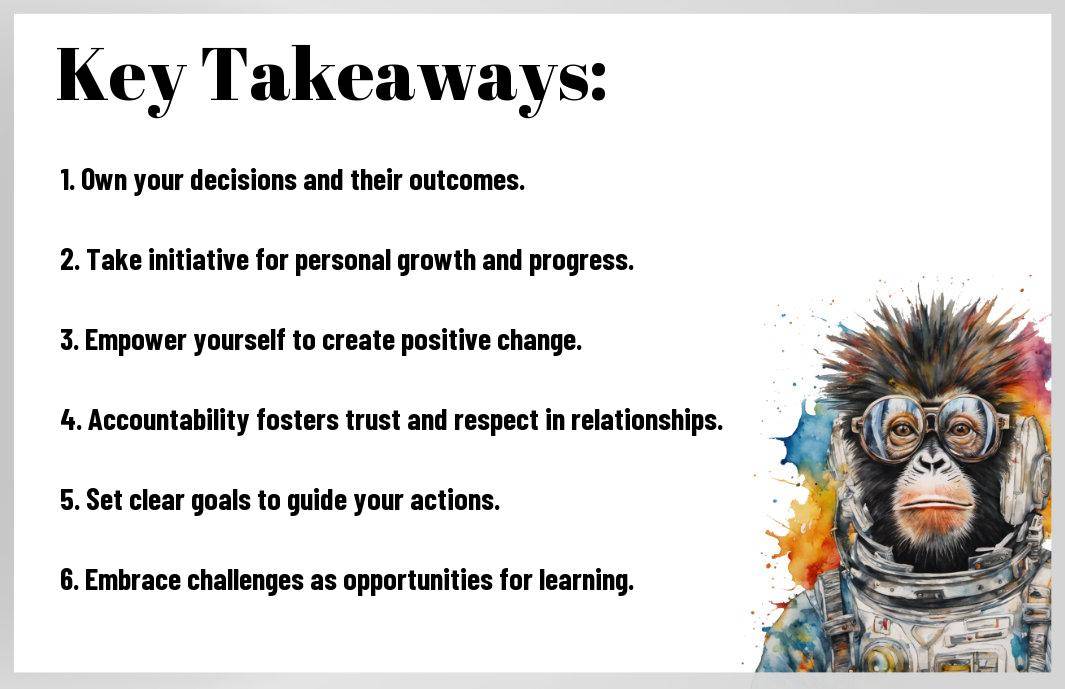
Newsletter Subscribe
Enter your email address below and subscribe to our newsletter

Enter your email address below and subscribe to our newsletter

You hold the key to your own destiny, and taking responsibility for your actions is the way to unlock it. If you want to create a future that aligns with your dreams and aspirations, it’s necessary to understand that every choice you make matters. Embracing this power allows you to turn challenges into opportunities, fostering personal growth and resilience. By taking charge, you will not only enhance your life but also contribute positively to those around you. For further insights, explore The Power of Taking Full Responsibility for Your Life.

A strong sense of personal responsibility is crucial for anyone who seeks to shape their own future. By recognizing that our choices dictate our path, we empower ourselves to take action rather than waiting for circumstances to change. This mindset fosters a proactive approach to life, allowing us to pursue our goals and navigate obstacles with resilience.
The concept of personal responsibility revolves around the idea that each individual is accountable for their actions and decisions. It involves acknowledging the influence of our choices on our lives and understanding that we have the power to effect change. When we embrace personal responsibility, we accept that we are the authors of our own stories.
With a commitment to personal responsibility, I find greater control over my life and outcomes. By taking ownership of my decisions, I can address challenges more effectively and cultivate a sense of purpose.
Plus, taking personal responsibility leads to you setting realistic goals and achieving them through dedicated effort. Ignoring this principle can result in feelings of helplessness and blame, which only distract I from progress. When I own my choices, I build confidence and resilience, enabling a positive mindset. Embracing this journey empowers you to navigate life’s hurdles, ultimately shaping a future that genuinely reflects your aspirations and values.
You have the power to shape your destiny by embracing personal responsibility. By acknowledging that we cannot control external circumstances, we can focus on what truly matters: our actions and responses. This transformation begins with introspection and a willingness to change ourselves. To dive deeper into this idea, check out what is your understanding in this quote ‘You must take …’.
Clear goals provide a roadmap for success and help you maintain focus on your objectives. By defining what you truly want to achieve, I find it easier to prioritize my actions and make steady progress. Goals give us direction and motivate us to take the necessary steps toward our vision of the future.
At the heart of taking charge of our future lies the ability to make informed decisions. I often reflect on how each choice I make can significantly influence my path. Whether it’s a small daily decision or a major life choice, the impact can be profound. There is a fine balance between fear and opportunity; understanding this balance empowers me to move forward with confidence.
Another key aspect of decision-making is recognizing that every choice carries risks and rewards. I have learned that it is vital to weigh these factors carefully and consider both immediate and long-term consequences. By prioritizing my values, I can make choices that align with my goals. This process not only builds my self-confidence but also allows me to embrace challenges as opportunities for personal growth. Ultimately, understanding the power of my decisions enables me to create a future that is both meaningful and fulfilling.

Once again, as I navigate the complexities of life, I am reminded that our ability to overcome obstacles is imperative for shaping our future. The path may seem daunting, but the mindset of embracing challenges can turn these barriers into stepping stones for growth. By exploring the insights shared in Responsibility: Expected, Taken, Recognized, we can cultivate a proactive approach to our responsibilities.
At times, I find it imperative to pinpoint the specific barriers that hinder my progress. These obstacles can range from external factors, like economic conditions, to internal struggles, such as self-doubt or fear of failure. By identifying these challenges, I can formulate a targeted approach to overcoming them.
With each setback I encounter, I learn the value of resilience in sustaining my efforts toward a brighter future. Embracing a positive mindset, surrounding myself with supportive individuals, and maintaining a flexible approach are key elements in my strategy. Investing in my mental and emotional well-being not only aids my personal growth but also fortifies my determination to push through adversity.
Identifying my emotional and mental resilience is the first step toward building my strength. Developing a support network, practicing self-care, and fostering a positive mindset can significantly impact my ability to cope with challenges. By prioritizing these strategies, I can enhance my capacity to bounce back from setbacks and maintain focus on my goals. Empowering myself through continuous learning and adaptation ultimately fosters a greater sense of control over my journey toward success.
Not taking responsibility for our actions can lead to a cycle of blame and stagnation. When we embrace accountability, we gain control of our direction and outcomes in life. Acknowledging our role in both successes and failures empowers us to make informed decisions and fosters growth. This personal ownership is not just a path to growth; it also establishes trust and integrity in our relationships, both personal and professional.
Beside holding others accountable, I find that the most transformative aspect of accountability begins with self-reflection. When I evaluate my choices regularly, I identify patterns that either propel or hinder my progress. This practice not only enhances my commitment to personal goals but also boosts my confidence in navigating challenges.
On the journey of accountability, I believe it’s vital to foster an environment that encourages others to take ownership of their actions. This includes providing constructive feedback and celebrating their efforts. When I create a safe space for open dialogue, it inspires others to recognize their contributions and areas for improvement.
And fostering accountability in others involves more than just giving feedback; it’s about modeling the behavior I wish to see. When I share my challenges and outcomes with honesty, it encourages my peers to reflect on their situations similarly. I find that recognizing achievements, no matter how small, builds confidence and propels individuals to strive for more. In doing so, I am not just advocating for accountability but also establishing a culture of support and growth.
Many people underestimate the power of a strong support network in shaping their future. Building connections with like-minded individuals can provide motivation, encouragement, and wisdom as you navigate through personal growth and challenges. Surrounding yourself with supportive people fosters a sense of belonging, which can propel you towards achieving your goals and manifesting your aspirations.
Importance of community cannot be understated; a supportive environment encourages you to express your thoughts and feelings openly. Engaging with others who share similar interests or experiences creates a foundation for collaboration, enhances personal development, and helps to reinforce your sense of identity. A thriving community is invaluable—shaping your perspective and pushing you to strive for greatness.
Finding the right support involves identifying individuals who resonate with your values and vision for the future. A diverse network allows for a balance of perspectives, making it easier to navigate challenges. Engaging with mentors, peers, and friends can lead to powerful partnerships that enrich your life experience.
Support systems should include individuals who genuinely believe in you and are committed to your success. Look for those who provide constructive feedback, celebrate your achievements, and stand by you through tough times. Evaluating your connections helps you filter out any negative influences that drain your energy. Ultimately, finding the right people to uplift you not only enhances your journey but also sets a positive precedent for your future endeavors.

After setting goals and initiating action, it is necessary for I to focus on sustaining momentum. This involves regularly evaluating progress and celebrating small victories to keep motivation high. By doing so, I ensure that the efforts I have invested do not lose their drive, and I remain eager to pursue my goals. Sustaining momentum requires a conscious effort to stay engaged, seek out inspiration, and continuously remind myself of the reasons behind my ambition.
After I have established a routine, it is important to consistently track my progress. This means regularly assessing the steps I have taken and identifying any areas that may require adjustments. By maintaining a clear focus on my goals and recognizing both achievements and setbacks, I can make informed decisions about how to continue moving forward. Tracking my progress keeps me accountable and motivated toward my objectives.
Maintaining progress means being open to adapting to change as circumstances shift. I understand that the path to success is rarely linear, and flexibility is key to navigating the unexpected. By being receptive to new information and experiences, I can pivot my approach when needed, ensuring that I remain on track despite any obstacles that may arise.
For instance, if I encounter unforeseen challenges in my plan, such as resource limitations or shifting priorities, I must assess the situation objectively. Being adaptable enables me to reconsider my strategies and find innovative solutions that align with my goals. I can leverage these changes as opportunities for growth; dismissing them could hinder my potential for success. Adapting to change not only preserves my momentum but also strengthens my resilience in pursuing my objectives.
On the whole, embracing our responsibility to take charge of our own future empowers us to shape our lives and influences the paths we take. By actively making choices that align with our values and aspirations, I can cultivate a fulfilling life while encouraging you to do the same. Together, by acknowledging our roles in creating our destinies, we foster a sense of ownership that inspires positive change not just for ourselves but for those around us.
A: Taking responsibility for our future means actively engaging in decisions and actions that shape our life outcomes. This involves recognizing that our choices influence our personal and collective future, and it encourages proactive behavior in pursuing goals, managing challenges, and making informed decisions.
A: Individual responsibility fosters a sense of accountability, which can enhance community well-being. When each person takes charge of their actions and choices, it contributes to a culture of respect, support, and collaboration, leading to stronger communities that work together towards common goals and improvements.
A: Education is imperative in cultivating a sense of responsibility. It provides individuals with the knowledge and skills needed to make informed decisions, confront challenges, and understand the consequences of their actions. Furthermore, educational institutions can promote critical thinking and ethical considerations, guiding students in taking ownership of their futures.
A: Setting goals creates a clear direction for individuals and serves as a roadmap for achieving desired outcomes. By establishing specific, measurable, attainable, relevant, and time-bound goals, individuals can track their progress and hold themselves accountable, making it easier to take responsibility for their actions and choices along the way.
A: Encouraging a sense of responsibility in others can be achieved through open dialogue, mentorship, and modeling responsible behavior. Acknowledging efforts and successes, providing constructive feedback, and fostering a supportive environment can also inspire individuals to take ownership of their actions and contribute positively to their surroundings.
A: Understanding our core values helps align our actions with what we genuinely care about. When individuals are clear about their values, they can make decisions that reflect those beliefs, leading to a greater sense of personal responsibility and satisfaction in their choices, ultimately guiding them towards a fulfilling future.
A: Yes, taking responsibility is often a catalyst for personal growth. Facing challenges, learning from mistakes, and taking ownership of successes and failures encourage self-reflection and resilience. This process not only enhances self-awareness but also empowers individuals to evolve, adapt, and strive for improvement over time.